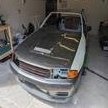Optimax Fuel Quality
Announcements
-
Similar Content
-
Latest Posts
-
its funny you linked that video. a friend set it to me last night. i commented there, and checked SAU to see if anyone had commented on my thread and saw someone had posted. will try to help others when i can.
-
My rotisserie is due to be delivered next week and I need to get my R32 mounted on to it. I know how to mount it on the actual rotisserie but those of you that have, did you add any additional bracing to the chassis? I was planning on welding some 1x1 box section across the top of the seatbelt buckles, across the back seats and then down to the front footwells (and possible across from there also? I've also put the behind dash bar back in to give a bit more strength. Its mostly going to be the floor and sills being cut out with a little on the rear quarters
-
By joshuaho96 · Posted
apparently people are still having trouble with this as well -
Only problem with that is it's obvious to the police, but same same with the aes valve. Most people get the valve precat so it's harder to see when looking under the car from the rear.







Recommended Posts
Create an account or sign in to comment
You need to be a member in order to leave a comment
Create an account
Sign up for a new account in our community. It's easy!
Register a new accountSign in
Already have an account? Sign in here.
Sign In Now